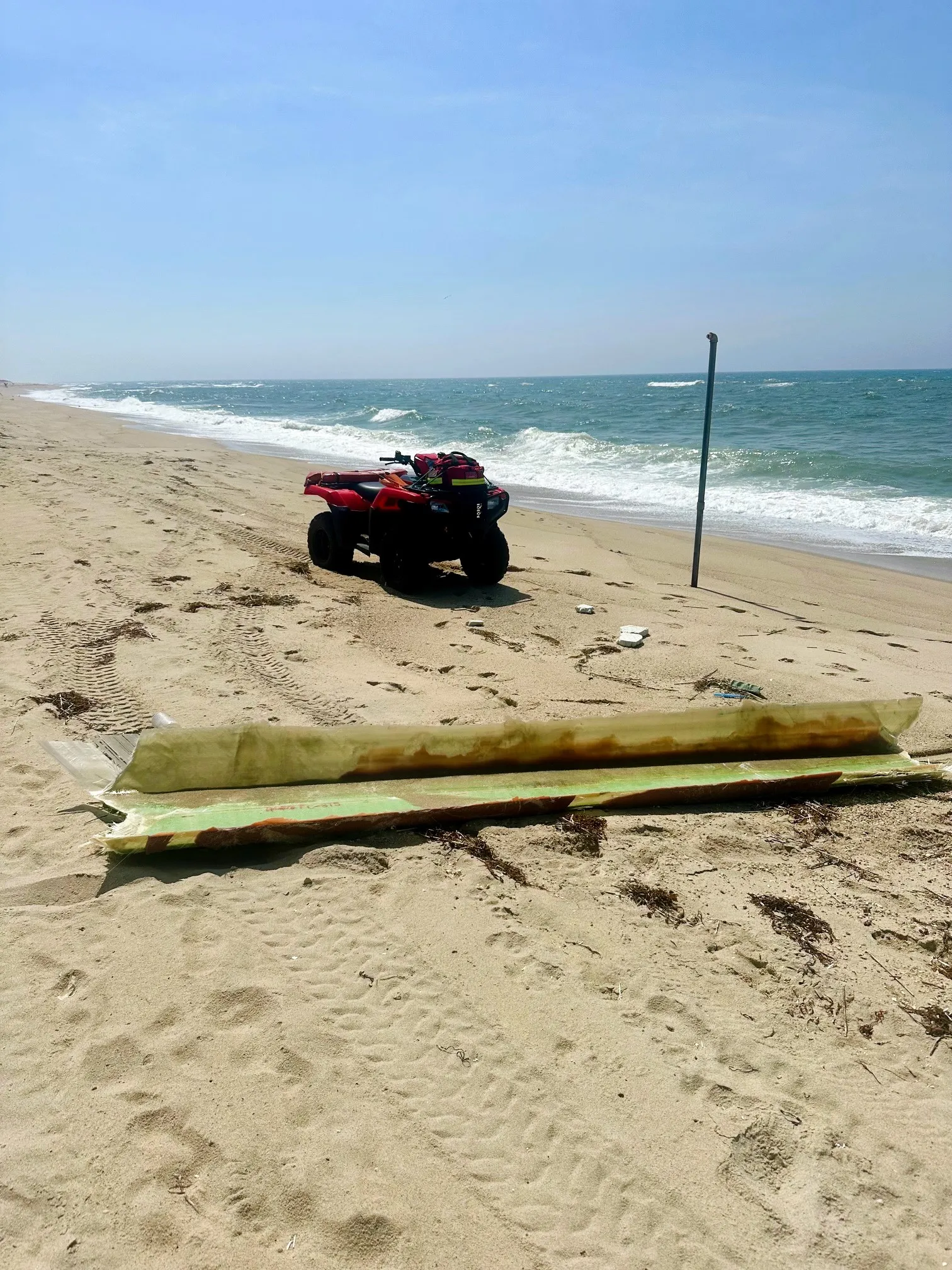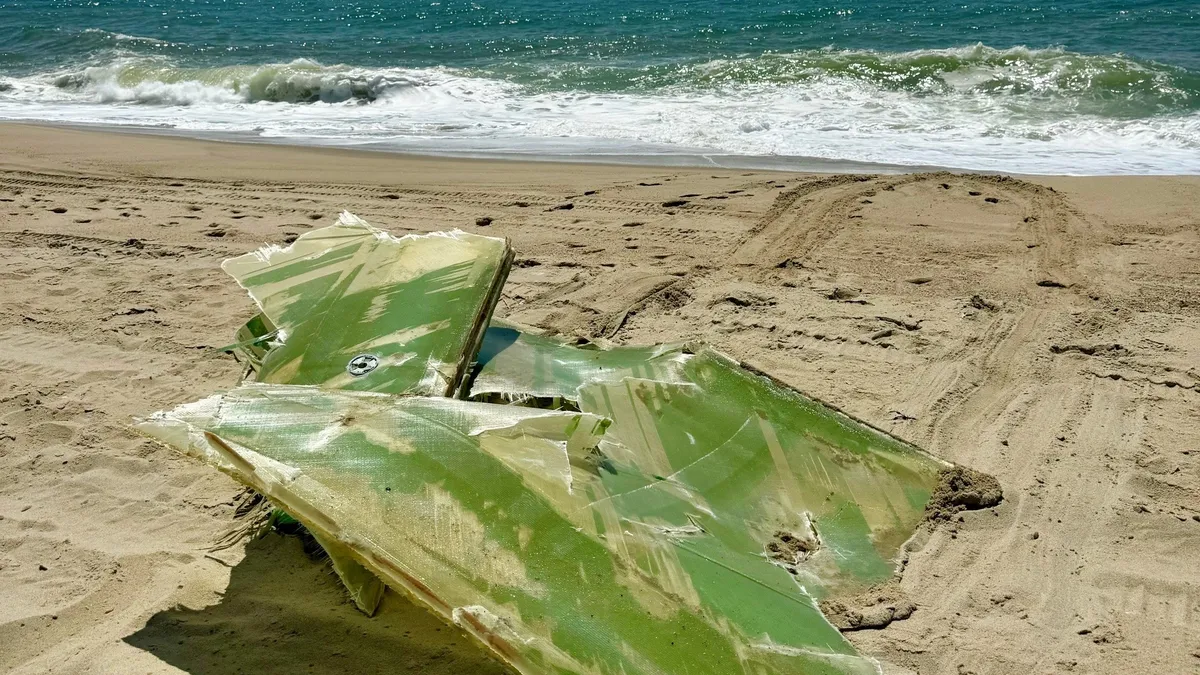Dive Brief:
- After a Vineyard Wind turbine blade suffered damage on Saturday, scattering fiberglass debris in the ocean, the U.S. Bureau of Safety and Environmental Enforcement issued a suspension order that halted construction and operations at the wind farm.
- Initially the blade “experienced a breakage approximately 20 meters out from the root,” said Vineyard Wind communications director Craig Gilvarg. On Thursday morning, a “significant part of the remaining GE Vernova blade detached from the turbine,” Vineyard Wind said in a release.
- Roger Martella, chief sustainability officer at GE Vernova — which manufactured the Haliade-X turbine — said during a Wednesday meeting of the Nantucket Select Board that the company has convened “a war room in upstate New York to do the root cause analysis as quickly as possible.”
Dive Insight:
GE Vernova, “as the project’s turbine and blade manufacturer and installation contractor,” will be responsible for determining that root cause, Gilvarg said. Each Haliade-X turbine has a capacity of 12 to 14.7 MW, according to GE, and 107-meter blades — close to the length of a football field.
The 800-MW Vineyard Wind 1 is a joint venture from Avangrid and Copenhagen Infrastructure Partners that began delivering power to the New England grid in January. The project is due to complete construction later this year.
“Vineyard Wind vessels are collecting fiberglass pieces on the site; a very large piece of debris is below the surface, in the water column,” the town of Nantucket said Thursday, adding that Vineyard Wind hopes to retrieve that piece while it remains offshore. “Vineyard Wind has advised that the majority of the interior foam from the entire blade was released on Saturday. However, additional debris could wash ashore tonight or tomorrow.”
On Tuesday, Nantucket Harbor Master Sheila Lucey warned island residents that the south shore beaches were closed to swimming “due to large floating debris and sharp fiberglass shards.” On Wednesday, those beaches were back open for swimming, but Lucey advised residents to use footwear and not bring their pets.

BSEE’s suspension order mandates that Vineyard Wind cease all power production until the agency can determine whether the blade failure affects any other turbines, and suspends installation of new turbines. The agency has also issued a preservation order to “safeguard any evidence that may be relevant to determining the cause of the incident.”
The Nantucket Select Board’s meeting drew 1,600 virtual viewers and 230 total participants, the town said Wednesday. Representatives from Vineyard Wind and GE Vernova attended the meeting and answered questions, but were at times drowned out or interrupted by the audience.
“I know tensions are high here,” said Chair Brooke Mohr while calling for order. In a video statement posted earlier that day, Mohr called the blade failure “alarming and deeply concerning,” and said the board would seek “every remedy available” to hold Vineyard Wind accountable.
While addressing the board, Vineyard Wind CEO Klaus Moeller said he learned of the blade failure soon after it occurred Saturday night thanks to the sensors and alarm system in the turbine.
“One of the blades on one of the positions was broken and folded over, bended over, and was not pointing in the direction that it should,” he said. “It's an automatic system, so the system actually shuts it down, and that’s what happened here.”
Vineyard Wind initially focused on “bigger pieces [of debris] and got those secure” before transporting them to New Bedford for analysis, Moeller said. “Luckily, we know that none of this debris is toxic and there's no spill,” he added, and was interrupted by loud coughing from the audience.
Later, Moeller clarified, “I didn't mean to imply that it was not serious or in some ways dangerous. I just meant that it was not a spill of oil or a substance like that. I am aware this is very serious, and that's why we want to recover everything.”
Renjith Viripullan, executive fleet engineering director at GE Vernova, said that the chemicals used in the blade are “inert material” and that the company doesn’t see evidence so far that any additional components have been released into the water.
However, Viripullan deferred a board member’s question about whether the damaged blade could lead to PFAS contamination. “We would take that question back, and we’ll come back with that,” he said.
The audience and the board questioned GE and Vineyard Wind’s representatives about known rates of blade failure, but no clear answers emerged. The Department of Energy’s Wind Energy Technologies Office said in an email that a 2015 report found catastrophic wind turbine failures occurred at a rate of “0.1%, or 40 incidents in a fleet comprising 40,000 turbines installed in the United States,” all of which were land-based at the time.
During the meeting, Moeller announced he’d been informed of “a development to the integrity of the blade,” then left to meet with his team. Vineyard Wind’s Senior Manager of Labor Relations and Workforce Development, Jennifer Cullen, later addressed the board to read an update from the project regarding “an observed compromise to the integrity of the blade” that evening.
“There has been a 500-meter safety zone implemented around the turbine and GE Vernova blade since Saturday night, and it has been under constant surveillance,” Cullen said.
Throughout the meeting, audience and board members remarked that they felt Vineyard Wind had failed to promptly notify them of the incident, citing a delay of 48 hours.
“I recognize that your statement is that you follow your regulatory requirements, and I just want to state for the record it was inadequate for this community,” Mohr said. “And hopefully you can answer as to how that would be different in the future.”
“Yes,” Moeller said. “I recognize that. We’ve gotten that feedback from the town also…. There’s really no excuse. We need to well inform you.”














